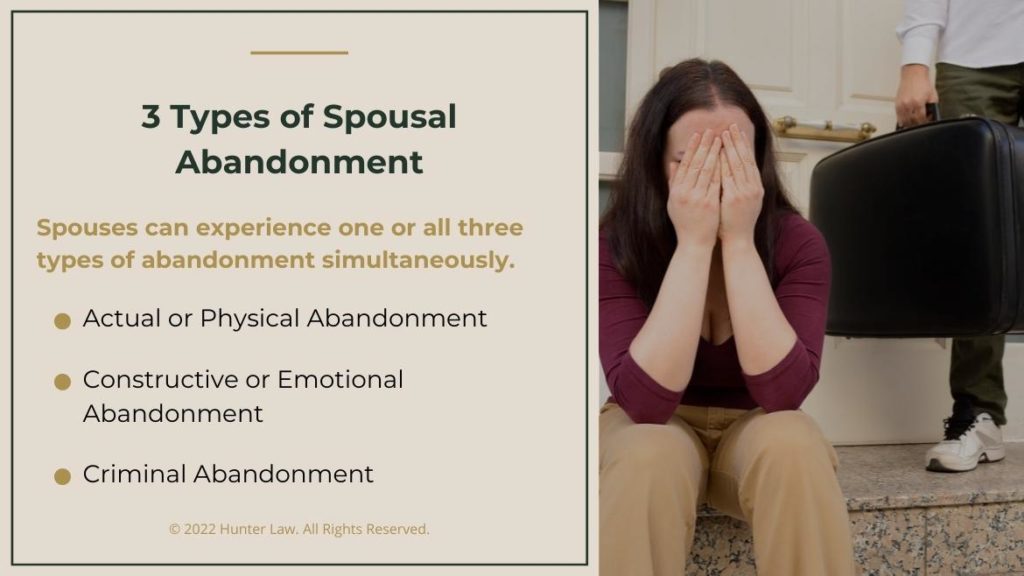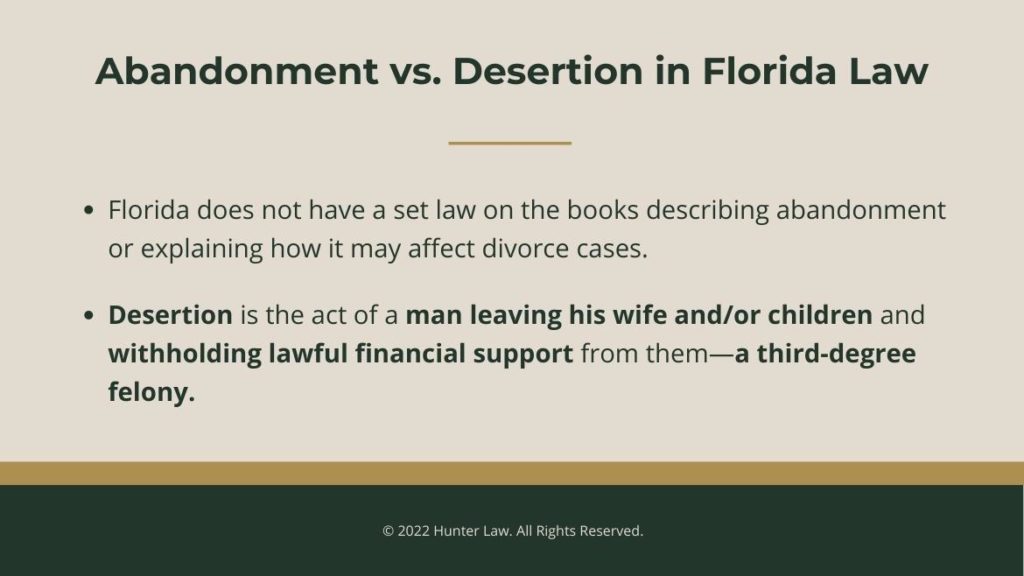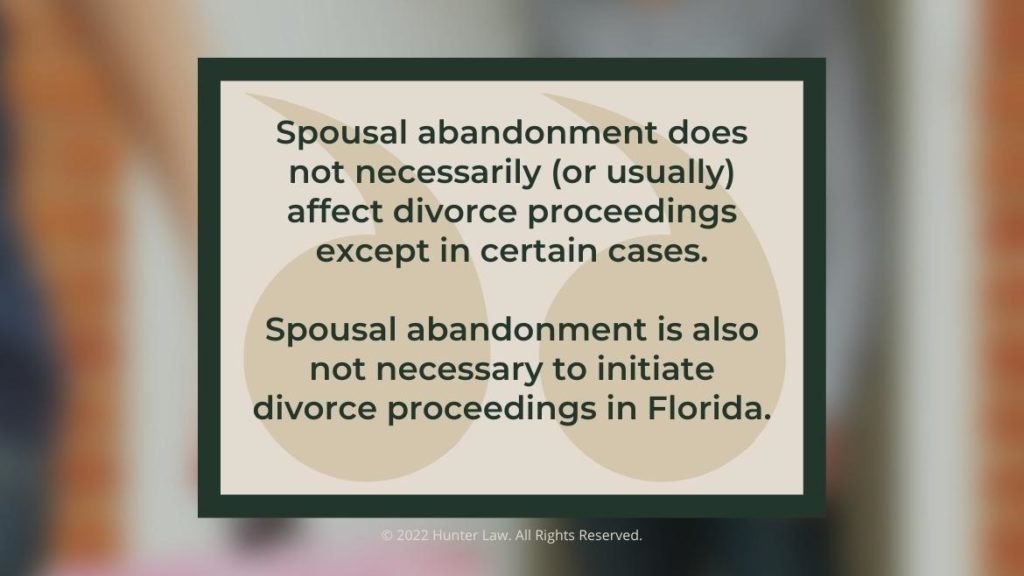Divorce is always a complicated affair. Despite being a no-fault divorce state, many Florida marriages end in divorce for one or more concrete reasons. In some circumstances, one spouse may allege that the other “abandoned” them and cite this abandonment as a reason for initiating divorce proceedings. This article will break down spousal abandonment laws in Florida and examine how spousal abandonment can affect divorce proceedings.
Types of Spousal Abandonment
Spousal abandonment is recognized in three types. Spouses can experience one or all three types of abandonment simultaneously depending on their circumstances.
Actual or Physical Abandonment
Actual or physical abandonment occurs when one spouse leaves the marital home and either never returns or never intends to return. Physical abandonment can occur even if the spouse in question leaves their physical possessions behind.
For example, a spouse leaves the marital home for one of their family members’ homes immediately and without warning. They intend to never return to the home but don’t initially seem to begin divorce proceedings. This is physical abandonment.
Constructive or Emotional Abandonment
Abandonment may also be emotional or constructive in nature rather than physical. This type of abandonment has a broader range of behaviors.
For instance, a spouse who “makes life unbearable” for their partner could be committing constructive or emotional abandonment. This type of behavior could be characterized by shouting, cursing, or emotionally abusing their spouse.
In some cases, a spouse withholding sex, withholding money, or engaging in infidelity or abuse may also be accused of emotional or constructive abandonment.
Overall, constructive abandonment includes any behavioral or emotional abandonment of marriage, even if the spouse in question stays living in the marital home.
Criminal Abandonment
The third type of abandonment is the most serious. Criminal abandonment (also called desertion – see more below) occurs when a spouse physically or constructively abandons their children if they have a financial obligation to them.
For instance, if one spouse who is the legal caretaker of the children suddenly leaves the marital home, they could be accused of criminal abandonment.
Similarly, a father who leaves the marital home, abandoning his children and with no intention of providing financial support, is committing criminal abandonment and could be prosecuted in the future.
Is One Spouse Leaving the Home in General Considered Abandonment?
No. For example, if one spouse leaves the marital home to work a job in another state, but both partners remain married, it is not considered abandonment.
Abandonment is primarily determined by intentions, both stated and observed. If a spouse leaves the marital home to stay at a friend’s house permanently, that is abandonment because the spouse never intends to return to the marriage. And, just because someone leaves the marital home does not mean the person who left is giving up any ownership interest in the home, or their obligation to pay the mortgage or rent.
Abandonment vs. Desertion in Florida Law
Although abandonment and desertion sound similar, they are distinct legal terms and concepts.
Florida does not have a law describing abandonment or explaining how it may affect divorce cases. However, it does have a law describing desertion.
According to Florida state law, desertion is the act of a man leaving his wife and/or children and withholding lawful financial support from them. Men who commit these acts are guilty of felonies of the third degree. However, under the law, no one will be prosecuted if grounds exist (that is, that the marriage is irretrievably broken) for divorce at the time of the desertion. The act of desertion itself may even be cited as proof that the marriage is irretrievably broken.
For example, if a man leaves his lawful family without warning and does not give his wife and children financial support, he may be guilty of desertion. Desertion is a valid ground for seeking divorce if the husband is not present or has led to another state/country.
Abandonment does not necessarily mean that one spouse or the other stops contributing financially to the marriage/marital assets, like a house.
Preparing for Divorce in Tampa with Advice From the Best Divorce Lawyers
Does a Person Lose “Interest” in Marital Property if They Abandon It?
Not necessarily. If one spouse leaves the marital home because of abuse or for any other reason, they may be alleged to have physically abandoned the marriage. But this does not waive their ownership or rights to certain marital assets like the marital home, furniture, or other physical property.
Note that there are some exceptions to this. For example, suppose one spouse abandons the other for five years, and neither spouse initiates divorce proceedings. In that case, the abandoned spouse may have more of a legal claim to the property should a divorce occur. This is doubly true if the abandoning spouse did not make any payments toward the property during those five years.
What Is the Difference Between Spousal Support and Alimony in Florida?
Does Spousal Abandonment in Florida Affect Divorce Proceedings?
The above example demonstrates the core applicability of abandonment in divorce cases. While abandonment is not always a crime, it almost always affects divorce proceedings in their details.
Florida is a no-fault divorce state. That means either spouse can initiate divorce proceedings at any time without having to claim a specific reason or prove wrongdoing on behalf of the other party.
However, Florida courts and judges may make decisions regarding property, alimony settlements, and child support payments while considering circumstantial evidence.
For instance, if a Florida divorce court hears that one spouse abandoned the marriage and left the other spouse with the majority of bills and financial obligations, the divorce court may feel less charitable toward the abandoning spouse. They may award the abandoned spouse more monetary support or something else.
Therefore, abandonment does affect divorce proceedings and can be used as important evidence in divorce cases. However, it is not a valid reason to initiate divorce since Florida does not require a reason in the first place.
How to Protect Yourself Legally and Emotionally When Divorcing a Narcissist
Summary of Spousal Abandonment Laws in Florida
Spousal abandonment is a legitimate court term. However, spousal abandonment does not necessarily (or usually) affect divorce proceedings except in certain cases. Spousal abandonment is also not necessary to initiate divorce proceedings in Florida.
If your spouse has abandoned you in one way or another, or if you believe they are currently in active desertion, you need legal professionals on your side to secure a favorable divorce outcome. Tampa family law attorneys can provide you with the necessary counsel and resources.
Contact Hunter Law today for a free case evaluation.






